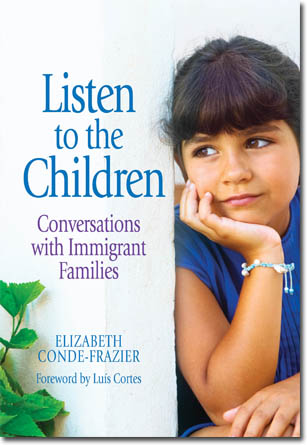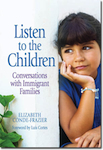 A couple weeks ago, I had the opportunity to preview a new bilingual book called Listen to the Children: Conversations with Immigrant Families by Rev. Dr. Elizabeth Conde-Frazier. It’s a valuable resource for any faith community that works with immigrants. With a practical focus and many examples from daily life, Listen to the Children offers guidance in the midst of troubled times. Here’s an interview I conducted with the author:
A couple weeks ago, I had the opportunity to preview a new bilingual book called Listen to the Children: Conversations with Immigrant Families by Rev. Dr. Elizabeth Conde-Frazier. It’s a valuable resource for any faith community that works with immigrants. With a practical focus and many examples from daily life, Listen to the Children offers guidance in the midst of troubled times. Here’s an interview I conducted with the author:
Why did you write Listen to the Children?
I have been working with immigrants in our Hispanic community since I was a teenager. I have listened to the stories of spouses, parents, and children who are living through the trauma of separation–and the challenges of reunification in a new land and assimilation in a new culture. And when I listen to the debates going on in the media, in the public arenas, around the “issues” of immigration, I think of the human beings affected by those issues and I remember their stories. It is time, I think, for others to hear those stories as well.
There are already many books about immigration and immigrants – what makes this one different?
Most of the books out there are political or ideological. We have an overabundance of politics around the question of immigration. In this book, I’m trying to be pastoral and practical, not political. I’m trying to focus on the immigrants themselves–the people, the families, and especially the children who are most vulnerable. Even people of faith may differ widely in questions of politics, but we should all be able to unite around caring for those that Jesus called “the least of these.” In our nation, 1.8 million children of immigrant families may be numbered among the “least of these.” The majority of these children live in poverty, have no access to healthcare, and suffer from some degree of traumatic stress. In this book, I want to educate, empower, and exhort parents, teachers, social workers, pastors, and people of faith and compassion to understand and intervene in caring for the needs of these children.
One recurring theme from my work on immigration issues in North Carolina is that many immigrant communities live in constant fear. How does fear impact immigrant families? How can faith communities respond?
Fear is a constant companion on the immigrant journey. From the initial separation to reunification to assimilation into the new land and culture, even immigrants with legal status experience fear related to the momentous change and uncertainty of relocating self or family to a new country.
Of course, immigrants with uncertain or precarious status (those who are called illegal or undocumented) live with the ever-present fear of being discovered, detained, and deported. They will tend to live with a mistrust or fear of authority–and they will impress that mistrust on their children. Because of this fear, many immigrants limit their mobility and strive to be “invisible.” In fact, in most cases, immigrants with precarious status will be scrupulously law-abiding to avoid being singled out for breaking any rule.
Undocumented immigrants know that their access to social services and programs is restricted, so erring on the side of caution, they will minimize any use of those services. Some won’t even dare to register their children for school–and if they do, as parents they will hesitate to get involve in activities, including teacher conferences or disciplinary appeals where children could really benefit from parental support. Children will share their parents’ fears and attempt the same patterns of invisibility. So they will avoid drawing attention to themselves in school, rarely asking questions or participating in class discussions and thus putting themselves at academic risk. They are also likely to suffer socially because they feel unable to communicate freely about their life outside of school–and they are often sworn to secrecy about their home and family history. All of this secrecy and anxiety takes its toll on children’s self esteem. That’s particularly hard on adolescents who should be learning to exercise their own voices and discover their own identities to make a place for themselves in the adult world. Instead, immigrant teens often feel increasingly marginalized and isolated–and therefore inferior. Truancy becomes an increasing problem among teens in immigrant families.
Faith communities can help out in a lot of different ways. We can offer safe spaces for immigrant families to come and be themselves, places where they don’t have to keep secrets or be invisible. We can establish tutoring programs, not only in English as a Second Language but also in subject areas where children may suffer academically because of their reticence in the classroom. We can offer activities that foster natural gifts and interests and that cultivate self esteem and leadership skills–activities such as performing arts, music, and sports. We can host social events for relationship building, and of course, we can provide opportunities for religious worship and education, allowing immigrants of all ages to further develop their own sense of spirituality and secure their faith in a God who can provide security and stability in a life rife with fear and uncertainty.
Policymakers at all levels – local, state and federal – are making decisions that affect immigrant families. What do you want policymakers to take away from Listen to the Children?
So many things! First of all, perhaps, to recognize that immigrants of any status are people with human needs and human rights like any other resident of this nation. A panel of experts has reported that 1 in 5 children in the United States today lives in an immigrant family–and the vast majority of those children will grow up to become a lifetime resident here. They will go to school and get jobs and become contributing members of society–and they will do it against odds that children of US-born children can hardly imagine. And so, I hope that policymakers will come to recognize that we need a new understanding of “status” in our nation. We need a more complex and nuanced definition of residency and citizenship. We need to offer more opportunities for those who seek “desirable” status to attain that goal. It would be my prayer that the policymakers shift their equations to consider the justice issues of human needs and human rights for all residents who call this nation their home.
Rev. Dr. Elizabeth Conde-Frazier is dean of Esperanza College at Eastern University in St. David’s, Pennsylvania and the author of the new release Listen to the Children: Conversations with Immigrant Families/Escuchemos a los niños: Conversaciones con familias inmigrantes (Judson Press). This bilingual resource invites the reader to eavesdrop on fictionalized conversations between immigrant parents, their children, and their caregivers, offering insight into their emotions, perceptions, and realities.
-Chris Liu-Beers, Program Associate

